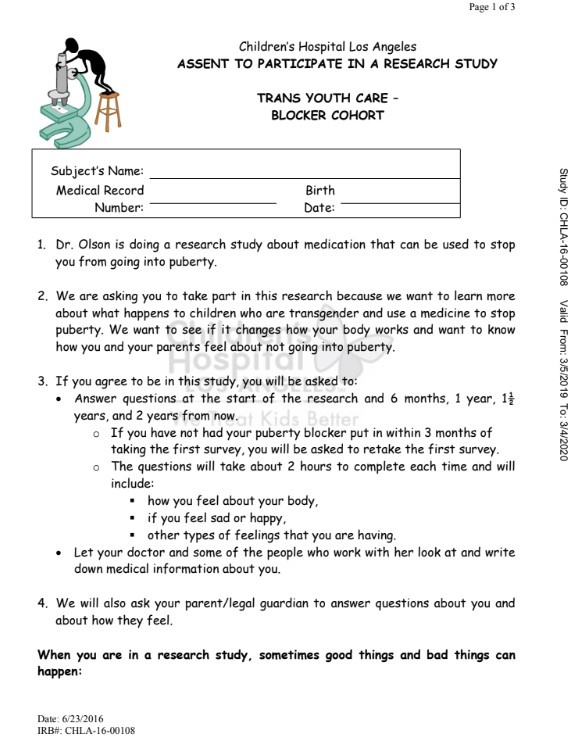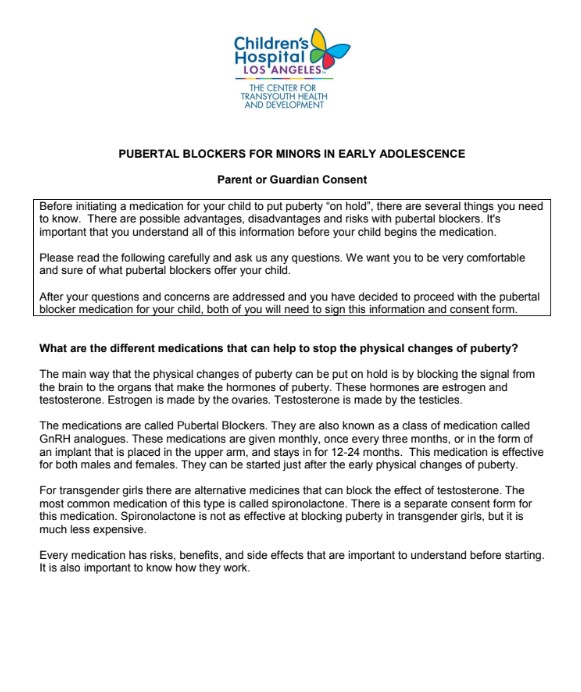Documents reveal that the Children’s Hospital Los Angeles has been running a research study on the effects of puberty blockers on youth.
Investigations
A document received in a Freedom of Information Act request reveals that the Children’s Hospital Los Angeles has been running a “research study” involving youth with the intent to study medicine that “can be used to stop you from going into puberty.” The document, written specifically for children, states that the researchers “want to learn more about what happens to children who are transgender and use a medicine to stop puberty.”

A second consent form describes the study’s purpose as intended to “evaluate how taking a medication called gonadotropin releasing hormone (GnRH) agonists used for blocking puberty affects your body.” Additionally, the study wants to “understand the effects of preventing puberty on your and your parent’s or legal guardian’s mental health and psychological well-being.” The cohort was seeking a total of 110 youth participants and would last two years. Participants would receive payments for their involvement in the study of $50 per visit, up to a total amount of $400.
According to the “Pubertal Blockers for Minors in Early Adolescence” consent document, puberty blockers are “used to help temporarily suspend or block the physical changes of puberty for your child.”

The document states:
If your child starts puberty blockers in the earliest stages of puberty, and then goes on to gender affirming hormones, they will not develop sperm or eggs. This means that they will not be able to have biological children. This is an important aspect of blocking puberty and progressing to hormones that you should understand prior to moving forward with puberty suppression. If your child discontinues the use of blockers, and does not go on gender affirming hormones, they will continue their pubertal development and 6-12 months after stopping medication, and fertility would be maintained.
The consent form informs the participant that using these medicines to block puberty is an “off-label use” which means it is “not approved by the Food and Drug Administration for this specific use.” It continues by stating that the “medication is recommended for your child based on the judgment and experience of our health care provider and is supported by the Society of Pediatric Endocrinology.”
This study is part of National Institute of Health (NIH) funded research titled “The Impact of Early Medical Treatment in Transgender Youth.” The project’s original aims were to “examine physiological and psychosocial effects of medical intervention for transgender and gender diverse (TGD) youth with gender dysphoria observed for 24-months.” The updated abstract states that the project has “successfully recruited” two cohorts which included “95 youth initiating pubertal suppression with gonadotropin releasing hormone analogs (GnRHa)” and another “316 youth initiating gender-affirming hormone (GAH) therapy (testosterone or estrogen).”
The project leaders want to continue the program with the participants for another four years and increase the diversity of the cohorts by “enrolling additional youth of color (YOC) into both cohorts (n=89)” and “enroll additional assigned males at birth specifically into the GAH cohort (n=110).”
On June 1, 2023, the project was awarded $963,441 in funding from the NIH.
Stay Informed
